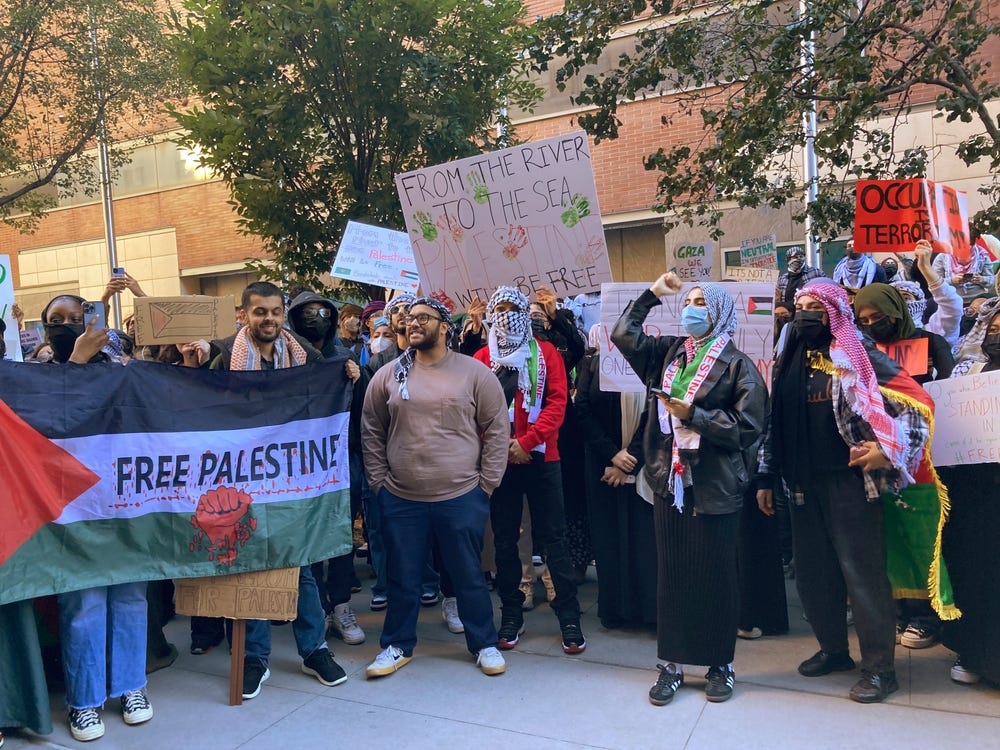E-Pluribus | October 20, 2023
Free speech for all, even the haters; (and yet) language can be very dangerous; the long reach of fake scholarship.
A round-up of the latest and best musings on the rise of illiberalism in the public discourse:
Nadine Strossen and Pamela Paresky: Even Antisemites Deserve Free Speech
First Amendment advocates often defend the free-speech rights of abhorrent people. They don’t cherish the task, but they do it because the value of speech is severely limited if only some of us get to speak freely. At The Free Press, Nadine Strossen and Pamela Paresky break down why, even during this terrible crisis in the middle east, free speech must still be available to all.
[A] question for now is whether the grotesque displays on campus in recent days constitute punishable intimidation or incitement.
First Amendment jurisprudence does not protect all speech. Tearing down posters in order to prevent others from seeing them, as some did at NYU, does not fall under its protections. And the government is empowered to restrict expression that has a tight and direct causal connection to specific harm.
This “emergency” standard was first laid out by Justice Louis Brandeis, the Court’s first Jewish justice. As he wrote in 1927, “To justify suppression of free speech there must be reasonable ground to fear that serious evil will result if free speech is practiced. There must be reasonable ground to believe that the danger apprehended is imminent. . . . Only an emergency can justify repression.”
[. . .]
The Court has recognized several context-based categories of speech that do satisfy the emergency principle, including intentional incitement to imminent violence. In addition, speakers may not issue “true threats”—speech that directly targets specific individuals with hateful, violent rhetoric, intending to instill a reasonable fear that the targeted individuals will be subject to violence. But these concepts are highly fact-specific, depending on all the circumstances in a particular situation.
Perhaps today, however, given the nature of the threat to Jews around the world and in this country, we should consider empowering the government to depart from these time-tested principles, and, at the least, crack down on speech that calls for the genocide of Jews.
We don’t think so. As Jews and as free-speech advocates, we believe that as painful as it is to hear speech that calls for our elimination, we must resist the impulse to silence it. For an object lesson, look to Europe.
In Germany’s Weimar Republic, Nazis rose to power despite the repeated suppression of their speech and publications under multiple laws. In fact, many historians and commentators believe that far from muting the Nazis’ messages, this censorship brought them attention and sympathy.
Just as Germany’s Weimar-era restrictions did not avert Nazism or genocide, its current strict censorial regime is not preventing virulent, violent antisemitism, nor discrimination or violence against other minorities. The European Parliament has acknowledged that hate speech and hate crimes have been increasing in the European Union despite strong hate speech laws, which have been in force since at least the 1980s. Despite its positive intent, such censorship not only stifles democratic discourse; it also fails to suppress repugnant views.
Read it all here.
Gal Beckerman: Beware the Language That Erases Reality
Just because speech should be free doesn’t mean that words can’t be extremely harmful. At The Atlantic, Gal Beckerman examines some of the rhetoric coming out amidst the Israeli-Palestinian conflict and explains the subtle (and not so subtle) messages conveyed by the words some are choosing to use.
The world has given us many examples of such disingenuous, vague, and purposely concealing language in the days since Hamas attacked Israel on October 7. I could offer a long catalog of phrases that deny the humanity of Israelis and Palestinians—including Senator Tom Cotton’s insistence that Israel can “bounce the rubble” in Gaza with its bombs, as if children don’t live there, and Israeli Defense Minister Yoav Gallant’s horrific description of Palestinians as “human animals” (apparently he may have been referring only to Hamas, though the distinction was lost). But I want to focus on a subtler yet no less insidious example of language that dehumanizes: an open letter published in The New York Review of Books on Saturday and signed by more than 80 writers who are all past participants of the Palestine Festival of Literature, among them many prominent names, including Ta-Nehisi Coates, Richard Ford, Annie Baker, and Eileen Myles. I focus on this example because these novelists and playwrights and poets can be expected, unlike politicians, to be sensitive to the necessity for precision and clarity—words are their vocation—and because the statement they produced, out of an undoubtedly genuine and deep concern for the population of Gaza, would make Orwell spin in his grave.
Two sentences of the 438-word text have haunted me for days. After deploring Israel’s bombardment of Gaza and fearing for Palestinians who are suffering unspeakable horrors, the signatories stop to describe what in their collective estimation happened on October 7 to unleash Israel’s fury: “On Saturday, after sixteen years of siege, Hamas militants broke out of Gaza. More than 1,300 Israelis were subsequently killed with over one hundred more taken hostage.”
To describe what Hamas did as breaking out of Gaza, as if what happened took place in a spontaneous moment of liberation, is to hide the fact that this was by all accounts a sophisticated and highly planned assault. Hamas didn’t break out of Gaza. Three thousand militants with intent and agency murdered as many civilians as they possibly could with the goal of drawing Israel into a brutal conflict, which is, sadly, precisely what is now taking place. Hamas’s leaders wanted to slow down whatever warming was developing between Israel and the Sunni Muslim states and remind the region and the world that in their eyes there is an existential war going on, one that will not stop until Israel is eliminated. This was not breaking out.
But far more upsetting is that passive voice of the next sentence, a passive voice that reveals a staggering moral blindness. Israelis “were subsequently killed.” Did they spontaneously combust? Were they struck by lightning? Fall down dead at the sight of the militants who had “broken out”? How do we explain this construction other than to call it a cruel abdication of responsibility, a decision on the part of these signatories not to assign any agency at all to Hamas, to blot out from sight the semiautomatic weapons and the knives? “Were subsequently killed.” The long history of excuses for every totalitarian ideology, including the one embraced by Orwell’s “comfortable English professor,” can be reduced to that nasty combination of three words, words from minds who simply refuse to confront the uncomfortable reality that the murder of babies and elderly peace activists was committed in the name of a cause they support.
Read the whole thing.
William Biagini: Fired scholar’s disputed race research totals more than 3,000 citations
Just because a fraud is fired doesn’t mean the impact of his deceptive research goes away. The College Fix’s William Biagini looked into how often discredited Florida State University researcher Eric Stewart’s dubious works were cited by other scholars and found numbers well into four figures.
Though Florida State University Professor Eric Stewart no longer works at the school after being terminated following a finding of research misconduct, his questionable work lives on in the thousands of academic papers which cited him.
The College Fix analyzed the number of Google Scholar citations of Stewart’s retracted papers—which add up to 793 in total. However, the university also fired Stewart because of problems confirming the data in 11 other papers. Those papers have been cited a total of 2,325 times, a College Fix analysis found.
Stewart (pictured) said he lost the data for those papers, but the intent to terminate letter stated that standard research practice is to keep back-up copies in the cloud or on hard drives.
“Based on the totality of the information and the glaring demonstration of data mismanagement and the unprecedented number of articles retracted, I find that the evidence supports a termination for incompetence and negligence in the performance of your duties,” Provost James Clark wrote in the initial letter informing Stewart he was under investigation.
He informed Stewart that the professor “demonstrated extreme negligence in basic data management, resulting in an unprecedented number of articles retracted, numerous other articles now in question, with the presence of no backup of the data for the publications in question,” the termination letter from Provost Clark reads.
Read it all.
Around Twitter (X)
Here’s part of a longer thread from Benjamin Ryan with the American Psychological Association''s 2023 DEI Inclusive Language Guide:
It’s safe to assume Thomas Chatterton Williams would file this under “Things I Thought I’d Never Have To Say”, although, to be fair, that file is getting larger every day:
And finally, Wesley Yang has one of his own for that same file as he spells out things that aren’t genocide:









